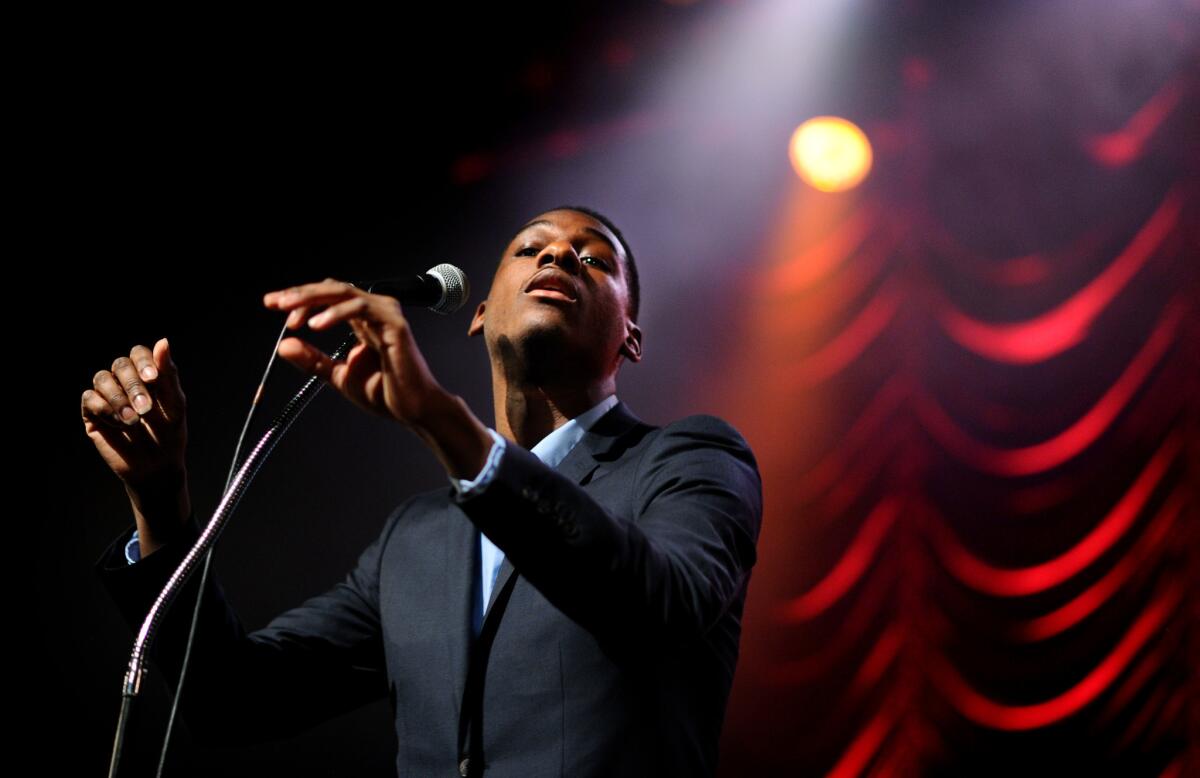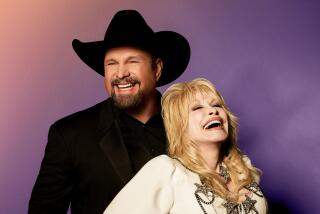Review: Leon Bridges channels a fantasy of yesteryear at the Fonda Theatre

Leon Bridges performs Monday night at the Fonda Theatre in Los Angeles.
- Share via
Introducing the members of his skilled backing band, Leon Bridges told the audience at the Fonda Theatre that five years ago he and his backup vocalist, Brittni Jessie, had danced together in a hip-hop video. Then, as though he’d revealed too much, he added, “You’ll never find it.”
He’s no doubt made sure of that.
One of this year’s most talked-about new artists, Bridges is a 26-year-old soul singer from Fort Worth, Texas, who looks back with single-minded devotion to R&B of the late 1950s and early 1960s. His debut album, “Coming Home,” carefully re-creates the lush but nimble sound of classic Sam Cooke; his wardrobe conjures images of men smoking cigarettes under lamp posts.
SIGN UP for the free Essential Arts & Culture newsletter >>
On Monday night at the Fonda, where the singer (and former aspiring dancer) played the first of two sold-out concerts, he even referred to songs as “numbers,” just like they did in the old days.
For his precision in reviving a beloved style, Bridges has been rewarded with success. At March’s tastemaking South by Southwest festival, he packed rooms months before the release of “Coming Home,” which has gone on to sell impressively. And next month he’ll have a new tune featured in “Concussion,” Will Smith’s Oscar-bait football drama.
Should the song earn a nomination, it’s easy to picture Bridges onstage at the Academy Awards, channeling a fantasy of yesterday to the visible delight of Hollywood’s dream factory.
That flair for period detail was on full display Monday in the warm stage lighting and Bridges’ tailored suit jacket and the crisp arrangements by his band, which included a producer of his album, guitarist Austin Jenkins of the Texas blues-rock group White Denim.
And, sure, it was pleasurable enough, never more than when Bridges flexed his footwork during the peppy “Smooth Sailin’.” Here was a guy certain to kill in his inevitable audition for some future Cooke biopic.
Yet as his comment about that buried hip-hop video suggested, Bridges seemed almost to be blotting out the modern world, willfully disavowing any connection to life after 1963. In some cases that was literally so: “Twistin’ & Groovin’” recounted the first flowering of his grandparents’ romance, he said, and “Lisa Sawyer” drew from his mother’s childhood in New Orleans.
But even when he was ostensibly singing about his own life -- as in “Better Man,” which he said he’d written as a way to atone for his failings as a lover -- Bridges clung so tightly to his chosen style that there was no way to hear his exceedingly polite performance as anything other than an elaborate exercise in mimicry.
Unlike other, more imaginative retro-soul singers who’ve excited the record industry in recent years -- Amy Winehouse, say, or Bruno Mars -- Bridges neither advances nor disrupts the established ideas about this music. Worse, he wants to be absolved of the artistic obligation to reflect the decades since those ideas began to form.
Maybe that’s why he was best when he was reaching back further -- way further -- than the early ’60s. At the end of his main set, Bridges excused most of the members of his band, then strapped on a guitar and turned toward Jessie for a stripped-down rendition of his song “River.” It’s a vividly phrased plea for forgiveness that blends sexual and religious imagery, and here it sounded not old but positively ancient.
How refreshing that was.
Twitter: @mikaelwood
More to Read
The biggest entertainment stories
Get our big stories about Hollywood, film, television, music, arts, culture and more right in your inbox as soon as they publish.
You may occasionally receive promotional content from the Los Angeles Times.










